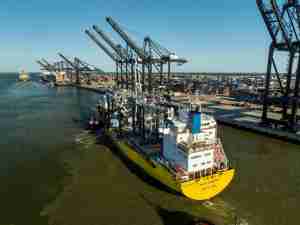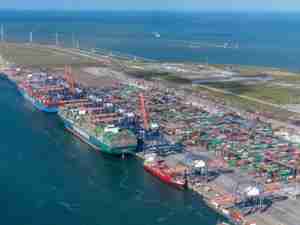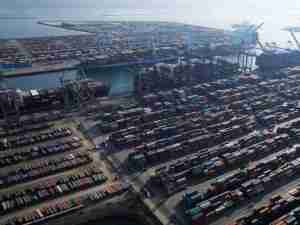The Port of Virginia® recently finalized the terms of purchase for five new ship-to-shore cranes that are part of an equipment renewal plan that ensures the port’s container terminals and cargo handling equipment are modern and prepared for the future.
“In order to maintain our efficiency and competitive edge, it’s important to be continually upgrading with modern equipment,” said Stephen A. Edwards, CEO and executive director of the Virginia Port Authority. “These cranes will ensure our lift capacity, berth productivity and the ability to handle multiple ultra-large container vessels (ULCVs) simultaneously at our primary container terminals, Virginia International Gateway (VIG) and Norfolk International Terminals (NIT).”
These cranes will be able to accommodate the ULCVs, that are making regular stops in Virginia and even higher-volume ships of the future. Each crane has the capacity reach across a vessel that is 26 containers wide, which is three-to-four containers beyond the reach of most cranes.
Delivery is set for December 2024 with two of the units going to VIG and three to the South Berth at NIT; the port will retire an equivalent number of existing cranes at those facilities. Once in place, the port will have 30 ship-to-shore cranes at work in the Norfolk Harbor and the ability to service the biggest container ships at sea.
“We are in an expansion phase and we must be able to further improve our productivity and capabilities,” Edwards said. “We are showing our customers and port users that they can continue to count on The Port of Virginia as they grow their vessel sizes and cargo volumes.”
The port is engaged in a significant rail capacity expansion program at NIT and nearing the start of the civil engineering needed to begin a complete renovation and modernization of NIT’s North Berth.
Crane Specifications:
• Builder: Shanghai-based Zhenhua Heavy Industries Co., Ltd, (called ZPMC),
• Crane height = 170’ above the dock
• Boom-out length = 226’ from the rail closest to the water
• Per unit weight = 1,827 tons
• Combined total cost (5 units) = $61.6 million, delivery included










